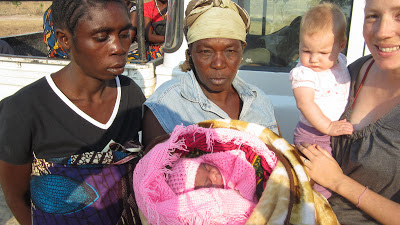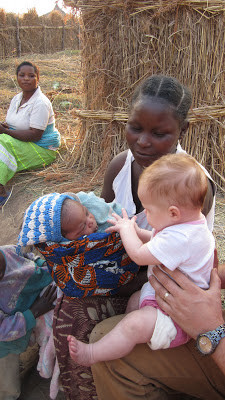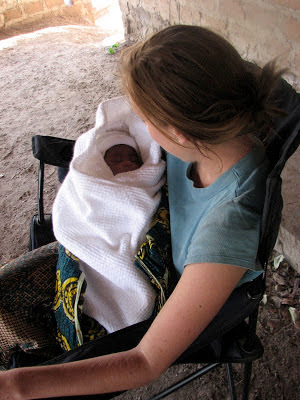The first birth I ever attended was back in 2008 in the
middle of the night during the cold season. At the time I was living right next
to the clinic and I had been recruited to come and hold a lantern so that the
other women could see what was going on.
 |
| view of the clinic from my old house in fimpulu |
The nurse on duty had told the women that his head hurt and
not to bother him, so they were officially in charge of the delivery of this
child. I stood at the foot of the bed holding the light source, shivering a bit,
wondering how long it actually took to birth a baby. Off and on the other women
made small talk, asking me if white women had vaginas and how many children I
was planning on having. The light in the room grew dimmer and dimmer as the
night wore on, the soot from the paraffin lamp clouding up the glass votive.
Just when we were all starting to squint at one another, the woman on the table
began to squirm. The other women in the room jumped into action, yelling at her
to push until out popped a baby – squirt- plop-splash – into a pile of blood and
amniotic fluid. I was immediately queasy. I could have sworn that that woman
just ripped in half and was now bleeding to death. The baby that had just
fallen out on to the table was picked up, wrapped up and laid on the bed
without its gender being announced. No one counted fingers and toes. No one
said anything, really. The aunties began wiping up the bare-metal birthing table,
the mother got dressed and everyone proceeded to walk home, in the dark, at 2am,
with the newborn. I went home slightly shell-shocked, wondering if all women
gave birth in cold, dark and scarily stoic rooms. My ponderings after that
first birth was what prompted me to keep learning. Difficult as it has been at
times, I’m grateful for everything I’ve been fortunate enough to witness – the
good, the bad and the ugly.
 |
| morning after bana kalobw's son lucky was born |
In my last post about
birth preparedness, I wrote about some
of the good, indeed the GREAT(!) aspects of the birth culture in rural Zambia.
But even as I was wrapping up that post, I already knew that there was more to
the story. There is much beauty in the birth culture here – a quiet trust and
acceptance, a support system bar none and the strength of a pride of she-lions.
But there are specific realities running parallel to all of these truths that
are less attractive, and often down right dangerous. They are things that keep
Zambia’s maternal death rate and infant mortality amongst the highest in the
world. The joy of peaceful childbirth can quickly turn into life-threatening
terror here – something which the first world also needs to hear.
 |
| helping babies breathe flow chart on clinic wall |
Most women are painfully ignorant regarding their own
physiology. Asking me whether I had a vagina was only one indication that most
ladies don’t know what all is stuffed inside their midsection. The Bemba
vocabulary doesn’t lend itself to specifics either. While there are technical
words for most of the individual organs and parts, “mu mala” or “the stomach”
is the catch all for anything in that region. Asking women to identify pain is
a challenge as “mu mala” is always the answer. Whether that’s a nauseous
stomach pain, abdominal cramp, lower back-ache or a deep contraction – its all
“ndekalipa mu mala” – my stomach hurts. Likewise, when discussing contractions,
there are no words for that either. Women in labor do not articulate between
the contraction pain and general pain. The vagueness of pain identification
means that there is no attempt to alleviate it. The clinic nurses refuse to let
women change positions while in active labor for fear that she might sit on the
baby. It is common for women to be commanded to “push until you die!” whether
or not she is having a pushing contracting, and this even before dilation is
complete. The forceful pushing often results in first, second and third degree
tears, which are sutured up with ZERO anesthetic. The midwives I’ve talked to
about this don’t seem bothered by not knowing when contractions are coming or
how often or how intense. Most birth attendants do not know how to determine
dilation or effacement either. Their job is mostly to command the woman to lie
down flat on her back and stay there until the baby crowns at which point
someone will rush to get a nurse who cuts the cord.
 |
| visiting nurse Becky helped bana Judy know when to stop pushing |
For all their strength and perseverance, the women aught to
be commended. And yet I’m waiting for one mama to finally scream out, “It
doesn’t have to be this brutal!” But that’s the problem with not knowing what
you don’t know. Women don’t complain because they don’t know when they should
or that they should. The mothers, traditional midwives and even most of the
clinic staff have an attitude of “This is birth. Birth is suffering. It is what
it is.”
 |
| spartan birth beds |
Our local clinic was built in the late 1990’s. Before then,
all babies were delivered at home, unassisted. The government has been pushing
women to come to the clinic, hoping that that fewer home births would mean
fewer maternal deaths. My recent conversation with the Chief Nursing Coordinator
at Mansa’s District Health Office revealed that while there has been a dramatic
increase in the number of births happening at the clinic, the maternal death
rate has not decreased AT ALL. Statistics report that only 53% of all
women deliver in a facility attended by a skilled worker. Given that most of
the “skilled workers” that we’ve seen “attend births” only pop in to cut a cord
after the baby is born, I’d argue that 53% is probably an inflated figure as
is.
 |
| First labor ward in Fimpulu |
Our clinic has commented that at least a woman coming to
birth at the health facility can be rushed to the hospital in case of
emergency. However, the ambulance is almost always dispatched elsewhere,
outside of coverage area, sitting in Mansa out of fuel, or waiting for the
driver to finish lunch. Calling Jeremy and Bethany is the second best option
and we have rushed dozens of women to the hospital in the wee hours of the
night. Through these emergency hospital runs we have learned that many women
stay at home for long periods of time with fevers, bleeding or other danger
signs before asking someone to take them to the clinic.
 |
| poster in the maternity ward |
We’ve distributed our phone numbers and made it known that
we are available to help pregnant women in any way we can. During the last full
moon, we were called eight times to come and rescue a laboring mother.
Most of the calls we get are from women who don’t want to sit on the back of a
bicycle for 30 minutes to an hour, bumping along through the bush, all while contracting
every three minutes for a minute at a time. I don’t blame them.
 |
bana mwandwe moved in with her sister a month
before she was due so that she wouldn't have
to make the 20 kilometer trek from her
house to the clinic |
I don’t like to be a Debbie downer, and to an extent, its
quite easy to romanticize bush living. Furthermore, focusing on the positive is
often a coping mechanism to avoid becoming irritable, frustrated and (cringe)
cynical. The truth is that as much as I admire these women, I don’t
envy the entirety of their birth experiences. When I was talking to that same
Nursing Coordinator at the District, he asked me, “So why didn’t you give birth
to Winnie in Fimpulu?” I answered him diplomatically about missing my mommy and
wanting to let the grandparents spend time with the baby. But I was thinking in
my head, “You’re kidding, right? You’re asking me this after lamenting the
District’s poor record of keeping women alive?”
 |
| poster hanging next to the labor beds |
We’ve known several women who didn’t know they were
expecting twins until a second baby came out. It’s normal to hear of babies who
were breach without anyone realizing it until a single foot appeared. We’ve
seen prolapsed cords and extreme hemorrhaging responded to with a casual
“oopsie daisy, maybe she needs a hospital.” We’ve watched as nurses yell in the
faces of babies who are born but never cry and seen nurses actually dunk the
baby’s head in a bucket of water to stimulate a cry reflex. Such neglect of
women and children is considered a breach of human rights in much of the first
world, and yet, my neighbor ladies labor on. In Zambia, 591 maternal deaths
occur per 100,000 live births. Compare that with the United States where
approximately 9 women die for every 100,000 live births – a statistic that
ACOG
and others
still feel is unacceptably
high. Can we just let the disparity sink in a little? 591 vs. 9… Ouch.
 |
| every life is precious. |
I had my reasons for going back to the states to have
Bronwyn. I had my reasons for choosing to deliver in a hospital setting. I had
my reasons for pursuing a natural child birth. I had my reasons for posting
pictures of my Zambian mama heroes on the wall at the foot of the bed, right
next to the labor map and 6 needs of a laboring woman. The biggest
factor that separates my story from the story of every woman in Fimpulu, is
that I had the chance to make an informed decision about all of these things.
While my heart longs to praise these women from the rooftops for what they go
through to give their children life, my heart also weeps for them in their unknowing
and therefore defenseless state.
 |
| our wall of inspiration. yes, it helped. |
And so I tell their story, so that you too may know; that
you may have the opportunity to pray for them, advocate for them where you can, and recalibrate your senses for the for the next time you hear the word birth.
Thanks for reading.
ps, HAVE YOU JOINED THE
PARTY YET?














